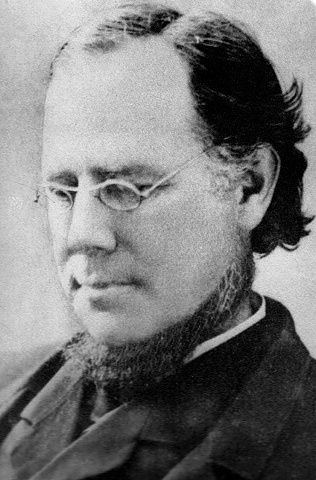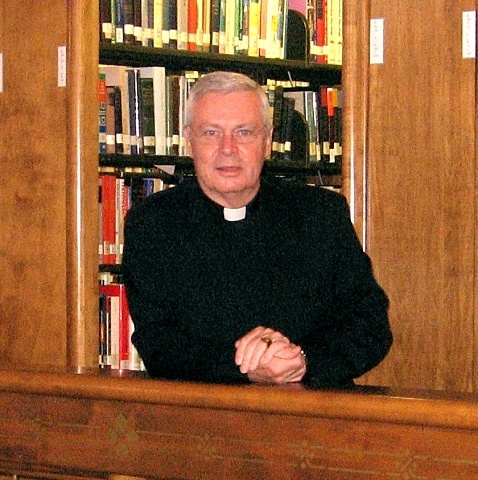March 24, 2013
This is the forty-sixth in a series of previously unpublished reflections from the 1854 spiritual notebook of Paulist Founder, Servant of God Father Isaac T. Hecker. The reflection series is being made public in conjunction with Father Hecker’s cause for canonization.

Before God shall I fear? Not at all! God is the same, yesterday, today and forever. God has deigned to favor me with the consolations of His grace and the embraces of His love. Should I doubt God’s friendship because I feel deprived of his consolations? Did He not love me when I turned my back towards Him? Will He refuse to love me now that I wish nothing so much as to give Him my whole heart?
Man cannot be more generous than God. Therefore I will say: My God! I love You above all things. Do what you please with me. Nothing shall separate me from my love for You. I love you because You are loving, beautiful and good, though I see You not. God does love me; for as Saint Bernard says, he who truly loves never doubts being loved. I love God; therefore God surely loves me.
The sunflower follows the course of the sun; and at night closes its leaves when the sun disappears. In the morning at its dawn the sunflower unfolds again its enamored bosom to the gentle influence of the sun. Faithfulness consists in a sincere, fervent and constant following of the guidance of the Holy Spirit. We should be faithful to the invitations of grace and the conduct of Divine Providence.

We have all had moments of feeling God’s distance. Faith is a relationship with the person of God and like other personal relationships the feeling of both closeness and of distance is a part of the experience. Even the saints, like Saint John of the Cross and more recently, Blessed Teresa of Calcutta wrote about the experience of feeling God’s distance.
Servant of God Isaac Hecker addresses this issue. “Should I doubt God’s friendship because I feel deprived of His consolations?” Hecker asks. God is the source of love. If God has loved us deeply even when we turn away, how much more will God love us when we turn towards Him? Reversing the great passage from Saint Paul in chapter 8 of Romans, ”Nothing shall separate us from the love of God.” Hecker writes, Nothing shall separate me from my love for God. Hecker bases this on a passage from the Cistercian Abbot Saint Bernard of Clairvaux (1090-1153) who wrote in his essay, “The Love of God” that the best way to feel that you are loved is to begin by loving others. If you love others, the love of God passes through you to the other, and you arrive at the wonderful discovery that you are a channel of God’s love. God holds us in His love, which we are free to accept or reject.
To go through life knowing you are loved is a wonderful thing, and for those who follow Jesus we know that God us deeply loves us. It liberate us, frees us to be faithful and attentive to God’s presence in our lives. Hecker uses the example of the sunflower to model how we are to be responsive to God. The sunflower opens to greet the sun each morning and closes when the sun sets each evening. Lent is a time when we work at being more attentive to God’s grace. Like Father Hecker let us trust that we are loved and let this experience teach us how to be more loving in return.
Hecker’s 1854 Spiritual Notebook:
Servant of God, Isaac Hecker wrote these spiritual notes as a young Redemptorist priest about 1854 and they have never been published. Hecker was 34 years old at the time and had been ordained a priest for five years. He loved his work as a Catholic evangelist. The Redemptorist mission band had expanded out of the New York state, and the missionaries’ national reputation continued to grow. Hecker had begun to focus his attention on Protestants who came out to the missions. To this purpose Hecker began to write in 1854 his invitation to Protestant America to consider the Catholic Church, “Questions of the Soul” which would make him a national figure in the American church.
Hecker collected and organized these notes that include writings and stories from Saint Alphonsus Liguori, the Jesuit spiritual writer Louis Lallemant and his disciple Jean Surin, the German mystic John Tauler, Saint Thomas Aquinas, Saint Theresa of Avila and Saint Jane de Chantal among others. These notes were a resource for his retreat work and spiritual direction. These short thematic reflections demonstrate Hecker’s growing proficiency in traditional Catholic spirituality some ten years after his conversion to the Catholic faith.
Publishing and disseminating the writing of Servant of God Isaac Hecker is the work of the Office for Hecker’s Cause.
Paulist Father Paul Robichaud CSP is Historian of the Paulist Fathers and Postulator of the Cause of Father Hecker. His office is located at the Hecker Center in Washington D.C.
If you have asked Father Hecker to pray for you or another person who is ill and you believe something miraculous has happened, please phone Father Robichaud at 202-269-2519 and tell him your story.